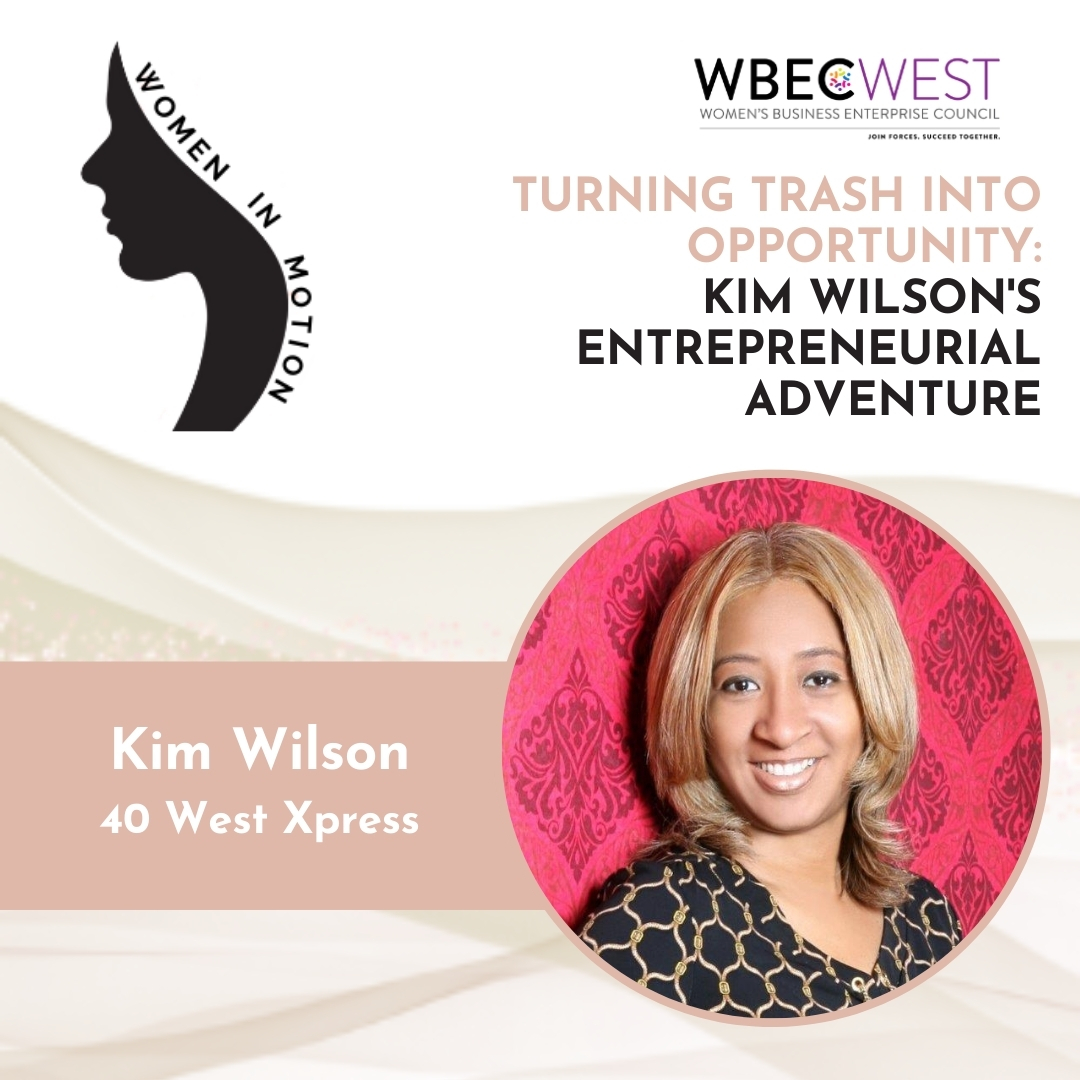
In this episode of Women in Motion, Lee Kantor is joined by Kim Wilson, owner of 40 West Xpress, a waste management and trash removal company. Kim shares her journey from starting a logistics company in December 2019 to pivoting to waste management due to the COVID-19 pandemic.
She discusses her business operations, which include residential services, evictions, and commercial cleanups. Kim highlights the challenges and opportunities of being a woman in a male-dominated industry, the importance of business credit, and her future aspirations, including disaster management services.
 In 2019, Kimberly Wilson, a licensed real estate agent in Las Vegas, saw firsthand the need for trash removal services for residential properties. She had several clients who inquired whether she knew of anyone who could remove trash from their properties left behind by tenants.
In 2019, Kimberly Wilson, a licensed real estate agent in Las Vegas, saw firsthand the need for trash removal services for residential properties. She had several clients who inquired whether she knew of anyone who could remove trash from their properties left behind by tenants.
As the need continued, she decided to take on the job herself with an old pickup truck and landscape trailer and started contacting property management companies for potential business. Business took off and in 2020, she officially founded 40 West Xpress and set it up as a Nevada LLC. In 2021, a second larger truck and trailer was purchased.
Many of her customers told her they contacted her because she was a woman owned “junk removal” company. Her son heard this and said Kimberly could be the “Top Dog”, which led to the dba name of Top Dog Hauling.
In 2022, a relationship with a concrete contractor landed Kimberly her first commercial job, followed by several requests for hoarder cleanout services. Business connections continued to flourish and in 2023, 40 West Xpress, dba Top Dog Hauling, was approved to be a supplier for Super Bowl LVIII. 
Today, there are conversations about Top Dog Hauling opening up a branch in San Antonio, Texas and offering container roll off services.
Music Provided by M PATH MUSIC
![]() This transcript is machine transcribed by Sonix
This transcript is machine transcribed by Sonix
TRANSCRIPT
Intro: Broadcasting live from the Business RadioX Studios, it’s time for Women In Motion. Brought to you by WBEC-West. Join forces. Succeed together. Now, here’s your host.
Lee Kantor: Lee Kantor here, another episode of Women In Motion and this is going to be a good one. But before we get started, it’s important to recognize our sponsor, WBEC-West. Without them, we couldn’t be sharing these important stories. Today on Women In Motion, we have Kim Wilson, owner of 40 West Xpress. Welcome.
Kim Wilson: Great. Thank you. Thank you so much.
Lee Kantor: I am so excited to learn what you’re up to. Tell us about 40 West Xpress. How are you serving folks?
Kim Wilson: Thank you. So, 40 West Xpress started initially as a logistics company, and so started out in December of 2019, wanting to create a logistics business and do hot shot trucking, transporting freight. Bought a dually, a flatbed, figured out how to self-certify my business as woman-owned. This thing called COVID came up, and then I got nervous, and so we pivoted to waste management. And so, that was what I started working as a DBA doing Top Dog Hauling. And, yeah, that’s what we do. We do waste management and trash removal, evictions and commercial cleanups.
Lee Kantor: So, is it primarily kind of business to business or do you have kind of residential consumers as clients as well?
Kim Wilson: Yeah. So, the bulk of it is residential, but we do have some commercial customers. And so, we have a concrete contractor that he’ll go on a job and then he’ll need us to come and haul away the concrete. We have a couple of commercial buildings. If they’re doing renovations or light demo work, then we’ll go and pick up the construction debris. And then, I also work with another general contractor on some of the sites that he’s at.
Lee Kantor: But primarily you’re going into like neighborhoods and being their person who takes their trash away?
Kim Wilson: That is correct. So, the bulk of our business, I would say right now would be evictions. So, if a tenant is getting evicted, we’ll go in after they’ve gotten out and the period has terminated for them to take their remainings out of the property, we’ll go and then trash out whatever is left behind.
Lee Kantor: So, you work, like, with multifamily units, things like that?
Kim Wilson: Some of them are apartments, some of them are homes, so single family homes. So, we have property managers that will give us a call and say, “Hey, we need a property clean out.” It could be a four bedroom home that a family was renting. And once they’ve moved out, oftentimes there’s always furniture left behind. And we’ve had a lot of furniture that we’ve been able to donate to other family members. We’ve donated to some nursing homes. And then, if it’s in decent condition, then we’ll go to Salvation Army and drop off some of the items as well.
Lee Kantor: So, now when you made the pivot, how did you choose this direction?
Kim Wilson: Yeah. So, COVID showed up and I’m like, “Okay. We need to put a pause on doing the out of state transportation.” I was just really nervous about it because we didn’t know what COVID was and how long it was going to be around. And then, I sell real estate part time, and so I was talking to a couple of friends and they were like, “Man, evictions are going to be crazy. People aren’t going to be able to pay their rent.” So, this is what they were predicting. And then, I started scratching my head and I’m like, “You know, maybe I can put this truck to work.” So, I had the truck and then I thought, “Okay. If I buy a trailer, I can get in business with servicing those needs.” And so, that’s how I pivoted to what I cloned the DBA as Top Dog Hauling.
Lee Kantor: And then, what was it like? You know, was this like a build it and they will come kind of situation? Or did you really have to lean on some of those relationships you had in the real estate business to even let them know that, “Hey, this is what we’re doing now”?
Kim Wilson: We were so busy during COVID. It was a good problem to have. So, I mentioned that I sell real estate part time, so I literally just started posting social media, you know, “Top Dog Hauling. Let us know how we can help you.” And because I do have a big network of realtor friends and property managers, it just took off like wildfire. Like, the phone just did not stop ringing.
Lee Kantor: So, now what was it like or what is it like being a woman in this kind of a male dominated industry?
Kim Wilson: It’s been a challenge. And so, I think it’s a good and a bad thing. So, I’ve had customers call and they’re like, “We saw your ad and we wanted to support a woman-owned business.” I’ve got many of those phone calls where they’re like, “Yay. Woman in this industry.”
Kim Wilson: But some of the challenges, to be honest, I think my journey has been maybe a little slower than a male because I’m a woman. And I had a guy make a note on one of my Facebook pages and he was like, “May I speak to the man in charge?” Now, I think he was joking, but he wasn’t the only one. You know, I’ve had a couple of people, I answer the phone and they’re like, “Can I speak to the owner?” “You’re talking to the owner.”
Kim Wilson: So, because it’s not very many of us women in the junk removal waste management industry, I feel like it’s just been I’ve been having to try to figure things out because I just don’t really have that many maybe even mentors or women that I can bounce things off.
Lee Kantor: So, the pandemic is over, is it still like are you going to get back into logistics or now you’re kind of putting all your chips on the table in this direction?
Kim Wilson: Yeah. This business has been flourishing. So, I started with one truck. I now have two trucks, two trailers. And I’m in the process of trying to seek financing to get some roll-off containers. So, I think we’re going to stay in this lane. It’s actually been doing really well.
Lee Kantor: Now, when it comes to scaling something like this, is there any advice you can give other people that are in a kind of fast growing marketplace? How did you go about, you know, doubling your capacity, at least, and more?
Kim Wilson: So, when I bought the dually and I bought the flatbed, I used my personal funds from my savings. And then, as the business needs, I was like I need to get another truck because I’ve only got the one truck, one trailer. And when that one got busy, then I have to turn jobs down. So, I was able to then start talking to people about business credit and I learned everything that I could about getting business credit. And I’m like, “Okay. Well, now that I got the business credit, let me see if I can get some financing.”
Kim Wilson: I applied for American Express card. And I have to tell you, I did a happy dance when I got approved for the business credit card. And so, from there, I’m utilizing the business credit. So, it was at least a year or two before I was able to really start thinking about business credit. But just kind of, again, a combination of my personal funds, and then, now, I’m to the point where I’ve got the business credit and able to now purchase stuff with that.
Lee Kantor: Can you explain to our listeners why it’s important and advantageous to get business credit?
Kim Wilson: Well, I mean, (A) it’s not against your own personal credit. And so, again, when I purchased the dually, that was on my credit. It was against my credit ratings. When you have the business credit, some companies will do a soft pull just to check your personal credit, but it doesn’t affect your personal credit. And so, it’s always a good idea just to try to take that route and get to where you’re utilizing the business credit.
Kim Wilson: I’ve been able to, I think, get loans under the business credit that I may not have been able to get under the personal credit. So, it was a really good decision for me to start really researching the business credit and start utilizing that.
Lee Kantor: Yeah. And sometimes you get better rates and sometimes it’s helping kind of the valuation of your company because now it has more credit. It could be worth more. It has more value.
Kim Wilson: Correct.
Lee Kantor: Now, the waste management industry, is that something you think that more women should take a look at? Maybe they’re self-selecting out before they even begin because they don’t even consider it. Like you said, you didn’t have any role models or mentors to help you. Is this something that you’d like to see more women get involved in waste management?
Kim Wilson: You know, I didn’t grow up saying I wanted to be a waste management business. But it’s just been such a good lane for me to be in. And I love when I run into other women that are in the industry. We absolutely need them. And there’s other things. It doesn’t have to necessarily be junk removal. It could be porta potties. It could be the roll-off containers. It could be environmental. Just maybe being a consultant for an environmental, doing safety. There’s so many different avenues. And I just think it’s, you know, typical that women just don’t look at blue collar jobs. But I get super excited when I see other women in the industry.
Lee Kantor: Are you still doing real estate stuff or are you kind of all in now on this adventure?
Kim Wilson: Real estate kind of I do it here and there. But I’ve really been focusing on trying to scale the business, and so this is my baby, and I’m super excited about what the future holds. I think I mentioned I’m in the process of getting financing for the roll-off containers. My end goal since I had the certification is to do disaster management services, maybe get with FEMA. And so, I know that’s where that certification will be useful to me. So, that’s kind of the end goal.
Lee Kantor: Now, you talked a little bit about why getting certified, but regarding WBEC-West and the WBEC-West community, how have you seen kind of value from being part of that community?
Kim Wilson: It was such a wonderful experience, and so I was following someone on Facebook and then I saw the representative from WBEC-West. I reached out to her. I’m kind of like Dora the Explorer, so when I see something, I just kind of like, “Well, what is this about?” And I kind of follow all the leads.
Kim Wilson: And so, she told me about the certification, what the process entailed. And then, I just got really intrigued. And they were so helpful answering every question. When I went through the application, if I didn’t know an answer, I just shot them an email and, boom, they were there to help me. So, to me, it was – I hate to say simple, but it wasn’t a complicated process and they were there every step of the way.
Lee Kantor: So, who is your ideal client right now?
Kim Wilson: So, I have a big Century 21 out here. It’s a big real estate broker. And the majority of my business, again doing the eviction cleanouts, the apartment turnovers. They have a bunch of property managers, and so that right now is my biggest customer.
Lee Kantor: And is that kind of the avatar for future customers? Is that who you’re looking to do business with?
Kim Wilson: Honestly, I want to get more into the commercial side, so that’s the reason for me purchasing these roll-off containers so that I can get more in construction side, maybe get with some general contractors. And, again, the end goal would be the disaster management services so that we could respond to if there’s a hurricane in Louisiana or wherever, that we could go and be a part of that mission.
Lee Kantor: So, is your work primarily in – are you in Nevada? Is that where you are?
Kim Wilson: Yeah, we’re in Nevada. And, actually, I just had a conversation with another lady, she does roll-off containers in Texas, and we’re looking to do a partnership in the San Antonio area, so super excited about that.
Lee Kantor: So, primarily you’re in Nevada, but once you get involved in this other aspect of the business, you could go anywhere?
Kim Wilson: Yeah. I mean, all I have to do is get a a dump trailer and a truck and then we’re in business. So, we’re looking at a couple of other states. I have family that’s in the Washington, D.C. area, and so looking at possibly adding to that location as well.
Lee Kantor: Well, congratulations on all the success. If somebody wants to have a more substantive conversation with you and learn more, is there a website? What’s the best way to learn more or connect with you?
Kim Wilson: So, the website is 40westxpress, and it’s 40-west-X-P-R-E-S-S-.com or that you shoot me an email at info@40, and that’s the number 40-west-xpress.com.
Lee Kantor: It’s four-zero-west-the letter X-P-R-E-S-S.com?
Kim Wilson: Correct.
Lee Kantor: Well, Kim, thank you so much for sharing your story. You’re doing such important work and we appreciate you.
Kim Wilson: Thank you so much. I appreciate the opportunity to get on here and I appreciate your time.
Lee Kantor: All right. This is Lee Kantor. We’ll see you all next time on Women In Motion.














